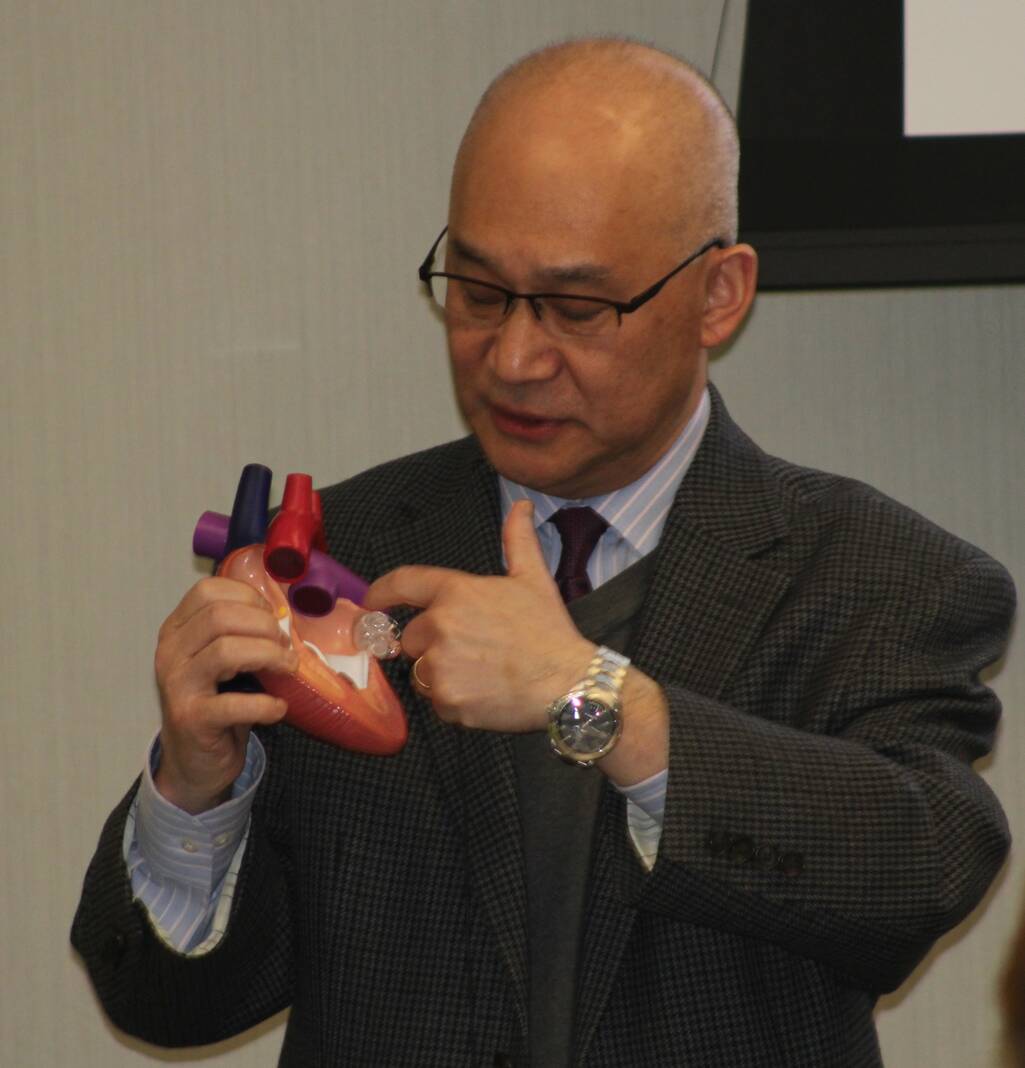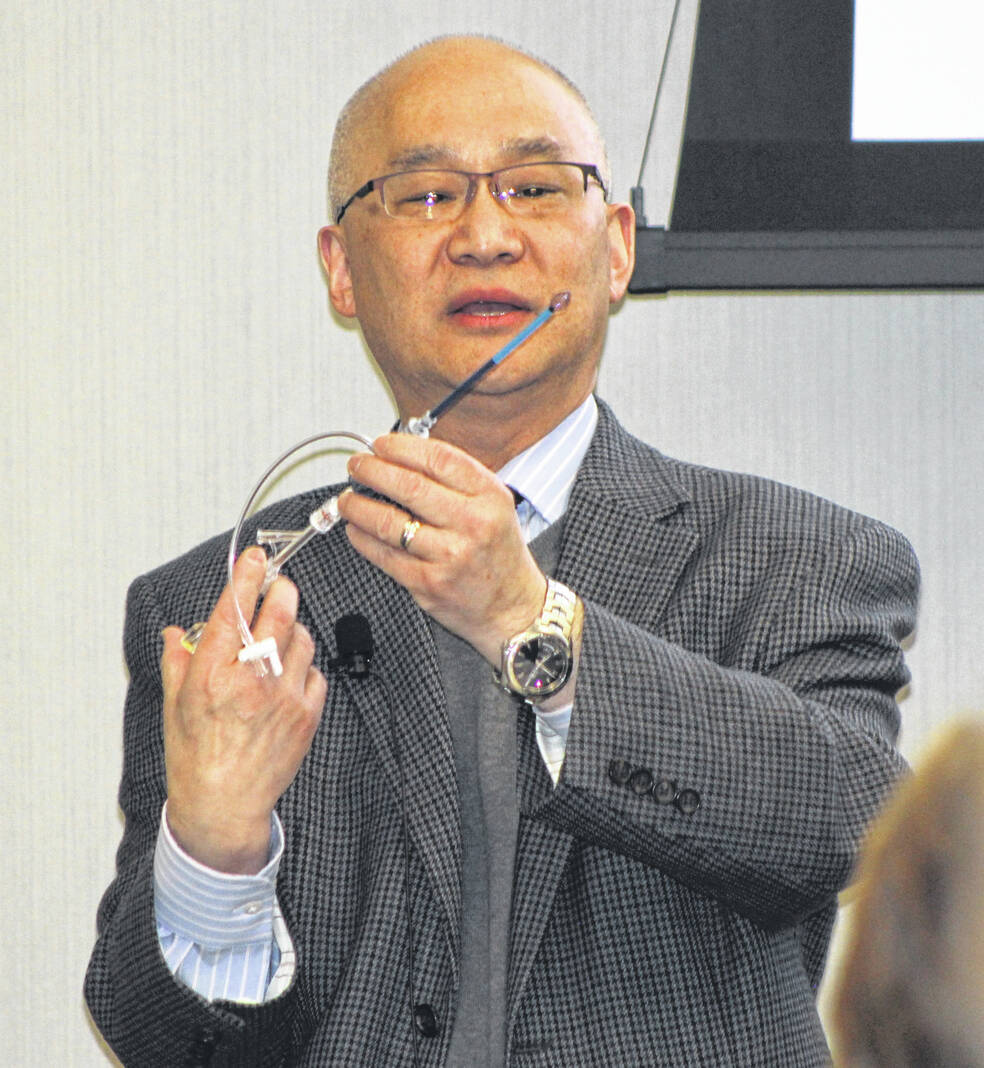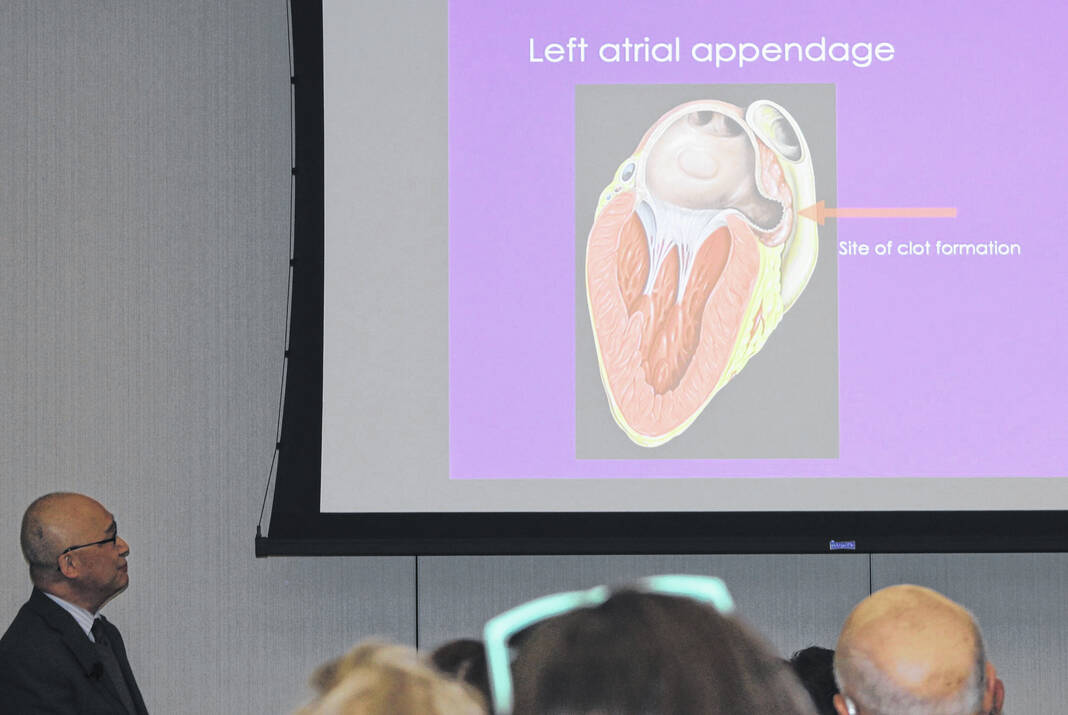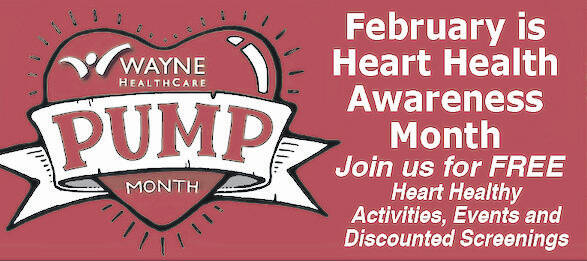
Dr. Chong displays a heart models with Watchman device implanted in the LAA to prevent blood clots and potential stroke.

Dr. Chong displays a heart models with Watchman device implanted in the LAA to prevent blood clots and potential stroke.
Dawn Hatfield | The Daily Advocate

Dr. Chong shows a catheter with the Watchman implant to demonstrate how small and simple-to-implant the device is.
Dawn Hatfield | The Daily Advocate

Shown on the screen is the left atrial appendage (LAA), a finger-like extension originating from the left atrium of the heart, where more than 90 percent of blood clots due to AFib develop.
Dawn Hatfield | The Daily Advocate

See article for details on $15 Lipid Panel, $20 EKG, and $25 Vascular Screening available through Wayne HealthCare only this February during “Pump Month.”
Wayne HealthCare Facebook
By Dawn Hatfield
DailyAdvocate.com
GREENVILLE — National Heart Health Month is here, and that means it is time for “Pump Month” at Wayne HealthCare. On Feb. 7, Dr. Henry Chong, M.D., FACC, cardiologist with Bethel Cardiology of Greenville, kicked off Wayne HealthCare Foundation’s 2023 Healthy Moments Series with a heart-healthy presentation titled “Atrial Fibrillation and Stroke Prevention.”
In a community room filled to capacity, Dr. Chong began with the cardio basics, explaining how a healthy heart should look and function. He demonstrated the healthy “BUM, bum; BUM, bum” pattern of the upper and lower chambers of the heart beating in perfectly alternating rhythm. Chong then demonstrated that afibrillation (AFib) looks like a fluttering rather than a steady “BUM…BUM” beating of the upper heart chambers. This fluttering does not produce a strong pumping of the upper chambers like a healthy heart has. AFib can lead to several symptoms and problems, not the least of which could be stroke or possible death. In the case of AFib, Chong stated the heart becomes weakened in addition to producing less than optimal blood flow. This increases the risk of blood clot development (a stroke risk), especially in the left atrial appendage (LAA), a finger-like extension originating from the main body of the left atrium.
According to the National Institute of Health, “Atrial fibrillation is the most common clinically important cardiac arrhythmia, occurring in approximately 0.4 percent to 1 percent of the general population and increasing with age to more than 8 percent in those older than 80 years of age.”
Dr. Chong reported this equates to more than 33 million patients worldwide with more than five million AFib patients in the U.S. alone. “Those with AFib are at nearly a five-fold increased risk of stroke compared to those without AFib,” explained Dr. Chong. So, in addition to attempting to improve rhythm management, stroke prevention should be a separate track of treatment for a patient with AFib.
According to Chong, “When it comes to AFib management, it’s like two sides of the railroad track. On one side, we work to control the heart rate; it’s called rhythm management… the other track is stroke prevention strategies. The two do not meet. They stay parallel forever, and they both go on forever. No matter how successful I am at treating one… one does not obviate the other.”
Dr. Chong then described blood-thinning options, such the more traditional Warfarin and the newer direct oral anticoagulants (DOACS) like Eliquis®. Although more expensive, Chong explained the DOACS offer fewer medication interactions and no food interactions compared to Warfarin and have been shown to be at least as effective as Warfarin at stroke prevention, with significant improvement over Warfarin in the hemorrhagic stroke category.
“Daily aspirin is NOT enough for AFib,” Chong warned numerous times throughout the evening.
The final portion of Dr. Chong’s presentation centered around the implantation of a Watchman closure device, developed to block off the LAA (that finger-like projection of the left atrium mentioned earlier) where the vast majority of blood clots form in patients with AFib. Watchman, which is inserted via catheter in the groin, does not require open-heart surgery. Chong reported the device has been studied over 20 years and in 10 clinical trials and is FDA-approved. In comparing long-term outcomes in the Watchman implant versus Warfarin, Chong reported a 55 percent reduction in disabling and fatal strokes and a 27 percent reduction in cardiovascular mortality.
In a population where only about half of all eligible patients are anti-coagulated, and the patient discontinuation rate of blood-thinning medications is high, the Watchman device provides a viable alternative treatment.
Dr. Chong was gracious with his time, allowing space for questions and chatting with many members of the audience after his closing remarks.
There are still two more weeks to celebrate National Heart Health. Take advantage of Wayne HealthCare’s discounted screenings during “Pump Month” (only during February):
—$15 Lipid Panel at Outpatient Lab, Monday – Friday 7 a.m. to 5 p.m. and Saturday 7 a.m. to noon (no appointment required but eight- to 12-hour fast is necessary)
—$20 EKG (appointment required)
—$25 Vascular Screening (appointment required)
Doctors’ orders are not required for any screening. EKG and vascular screening appointments may be booked at 937-547-5715.
“We all need to keep our hearts healthy,” encouraged Vice President of Business Development Terri Flood.
To help support these discounted vascular screenings, attend Heart Health Sip N Snack Board on Feb. 17 from 6:30 to 8:30 p.m. at The Winery at Versailles. Cost is $30 per person with proceeds going to Wayne HealthCare Foundation. Register at 937-526-3232.
Healthy Moments Presentations, sponsored By Wayne HealthCare Foundation, are educational presentations designed to provide information from subject matter experts on a variety of topics. Each presentation is open to the public and includes a complimentary meal. Healthy Moments programs are held at Wayne HealthCare in the community rooms. Please use the Harrison Street Entrance. A complimentary meal is served at 5:30 p.m. and presentation begins at 6 p.m. Join the next Healthy Moments presentation, “Get Moving in the Right Direction for a Healthy You!” on Feb. 21. For more information or to register, contact Robyn Feitshans at 937-569-6504 or [email protected].
An informative video on the Watchman implant is available from Boston Scientific Cardiology at: https://youtu.be/9KanoHoX_NA.
Reach Daily Advocate Reporter Dawn Hatfield at [email protected] and 937-569-0066.




